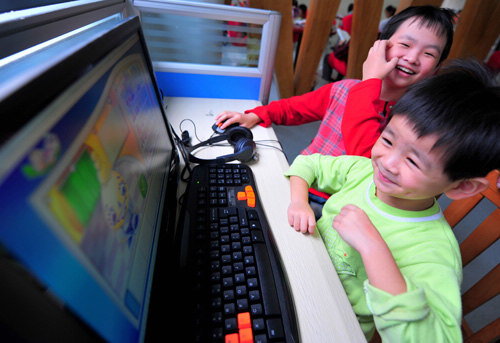|
 |
|
ANIMATED: Children play animated computer games in the Fujian Provincial Children's Library in Fuzhou on October 2, 2011 (WEI PEIQUAN) |
On the other hand, playing games on electronic devices allegedly have some detrimental effects on children's development.
Chen Mo, a member of the Basic Education Professional Committee of the Shanghai Psychological Society, said that most iPad games demand passive attention, so they will negatively affect young children's imagination, creativity, reasoning ability and their curiosity to explore the real world.
Chen believes electronic devices such as the iPad can affect children's thinking patterns, isolate them from the real world, and make them unable to cope with challenges of a complicated society.
"Now, quite a big proportion of children talk to others without looking at their eyes, which is a result of their habit in lowering their head to play with cellphones and the iPad for a long time," Chen said.
It is also known that prolonged electronic screen viewing can take a toll on people's eyesight. "The damage to young children at or below 3 years old is especially obvious since their eyes are not yet mature," said Li Mingwu, a doctor at the Ophthalmology Department of Peking University People's Hospital.
Li Mingwu warned that graphics on the iPad are usually very bright in colors, which strongly stimulate people's visual sense, so gazing at the screen for a long time can cause nearsightedness among babies.
Not long ago, a post on Weibo.com, China's twitter-like micro-blogging service, alleged that the iPad was the No.1 eyesight killer for children. It drew widespread attention to the problem. The post said that a 4-year-old who often used an iPad was diagnosed with 200 degrees of myopia, and a third-grade primary school student's vision dropped from 20/20 to 20/40 after using the iPad intensively in a month-long winter vocation.
Zhang Xiaojun, head of the Ophthalmologist Department of the No.2 Hospital Affiliated to Nanjing Medical University in east China's Jiangsu Province, suggested that very young children stay away from electronic products such as the iPad, while older children should play no more than half an hour at a time, and no more than one hour in a day.
A hard choice
After learning the iPad's potential harm to young children, Li Ming's mother found herself in a dilemma. She would like to protect her child from damage yet she thinks the iPad too good a teaching tool to give up.
She decided to monitor and restrict her son's access to electronic products to avoid damage to his eyesight.
Like Li Ming's mother, many parents have weighed advantages and disadvantages of electronic products such as the iPad as an early education tool, but they are divided on the issue, according to opinions posted at an early childhood education website, Edu.pcbaby.com.cn.
Netizen Meimeiqi believes that the iPad is a much more valuable early-education tool than traditional toys in that its applications can be constantly expanded, which will continuously attract curious children to learn. She said that she and her husband were amazed at the learning ability demonstrated by their 3-year-old, who had mastered some iPad functions that they had not.
A Netizen by the name of Star Arrives also stated that the iPad is an ideal teaching tool for young children, because it is visual and interactive. She hopes software developers will develop more good programs that are helpful to children.
Nonetheless, some parents prefer to keep their young children away from electronic products such as the iPad.
Netizen Flying Snow believes the iPad more a bane than a boon. She said that early education is to nurture children's good habits and the ability to learn rather than simply to instill knowledge into them such as letting them recite poems.
"In the current era children are exposed to too much information, so children should return to nature and communicate with other people, and in this way, they will grow healthily," she said.
Netizen Yang Xin said that she would not choose electronic products as early education tools for her child.
"What toddlers need most is to play with their parents and learn in the process. A hi-tech device cannot replace people-to-people communication, and indulging in a machine world will make children less social," she said.
Despite the potential harm, Netizen Lilyapan still would like to buy an iPad for her baby. But she said that she will control the time her child spends on the iPad, and use it only as a supplementary teaching tool.
Netizen Icecube said, "The iPad is only a tool in itself. Whether it is beneficial or harmful to children depends on whether parents can make their children use it reasonably."
Email us at: wanghairong@bjreview.com | 